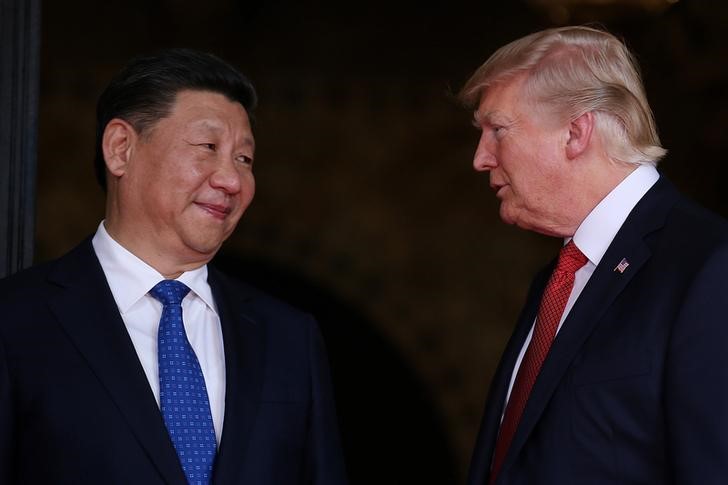By David Lawder
WASHINGTON, June 28 (Reuters) - U.S. President Donald Trump and Chinese President Xi Jinping are set for a high-stakes meeting in Japan on Saturday that could salvage faltering trade talks or plunge the world's two largest economies into a deeper, costlier trade war.
Trump is preparing to launch 25% tariffs on virtually all remaining Chinese imports, a $300 billion list of mostly consumer goods including cellphones, laptop computers, clothing, footwear and baby gear.
If the two leaders agree to restart negotiations, a delay in the tariffs is seen as likely, though Trump said on Friday he has made no such promise in advance. talks have taken place since negotiations collapsed in early May. Since then, Trump has raised tariffs on a previous $200 billion list of Chinese goods to 25% from 10%. If the two presidents agree to restart talks, it is unclear whether they would pick up where they left off.
The following is a breakdown of the issues unique to the U.S.-China trade talks:
ONE-WAY DEAL
Traditional free trade agreements aim to lower trade barriers between the countries signing them. They are built on the assumption that the parties will adhere to the terms of the agreement, with the benefit being increased trade and export opportunities within the free trade zone.
With China, the Trump administration is pushing for China to reform policies on trade, subsidy and intellectual property practices that it says have given Chinese companies an unfair advantage over U.S. companies for decades.
The United States is not promising China reforms in return. Rather, the Trump administration has said it would remove the tariffs it has imposed on China to try to force those changes. So the incentive to China is to return to the market access it had to the United States before Trump began the trade war.
That is similar to the sanctions that the United States has imposed on foreign entities such as Venezuela or Iran to increase pressure on their governments to change behaviour or policies.
Financial sanctions such as those imposed by the U.S. Treasury Department or export restrictions imposed on foreign firms by the Commerce Department are typically only lifted after the desired changes are verified and documented.
China has said any deal should be more two-way.
WOULD A DEAL END THE THREAT OF TARIFFS ON CHINESE GOODS?
Not likely.
The U.S. wants any deal to include an enforcement mechanism. Washington would frequently review China's compliance with pledges made for the deal and could reimpose tariffs for non-compliance.
U.S. officials see the continuing threat of tariffs as the "teeth" in any agreement. The demand for frequent compliance reviews reflects frustration among U.S. officials who have complained that China has failed to follow through on past commitments to implement free-market reforms.
HOW ARE TRADITIONAL TRADE AGREEMENTS ENFORCED?
Most free trade deals have built-in dispute settlement mechanisms for state-to-state disagreements over rule compliance, disputes between private investors and governments, or allegations of unfair anti-dumping and anti-subsidy duties. Arbitration panels often hear arguments from both sides, operating like a court.
Canada, for example, has brought challenges to U.S. anti-subsidy duties on softwood lumber before panels set up under the NAFTA, a mechanism that would be continued if the new U.S.-Mexico-Canada Agreement (USMCA) if ratified.
CAN COUNTRIES SEEK RELIEF AT THE WORLD TRADE ORGANIZATION?
The WTO's 164 members - which includes the United States and China - can challenge each other over unwarranted trade restrictions, illegal subsidies and other unfair practices and seek resolution through dispute settlement panels. But this process is seen as slow, and its decisions too easy for countries to ignore.
The United States has argued that the WTO has failed to rein in China's unfair practices, so it has acted on its own to force change in China.
The WTO's appellate body also could grind to a halt this year as Washington is currently blocking the appointment of judges. Because three judges are needed to rule on appeals, the system could break down when two judges' terms expire in December 2019.
